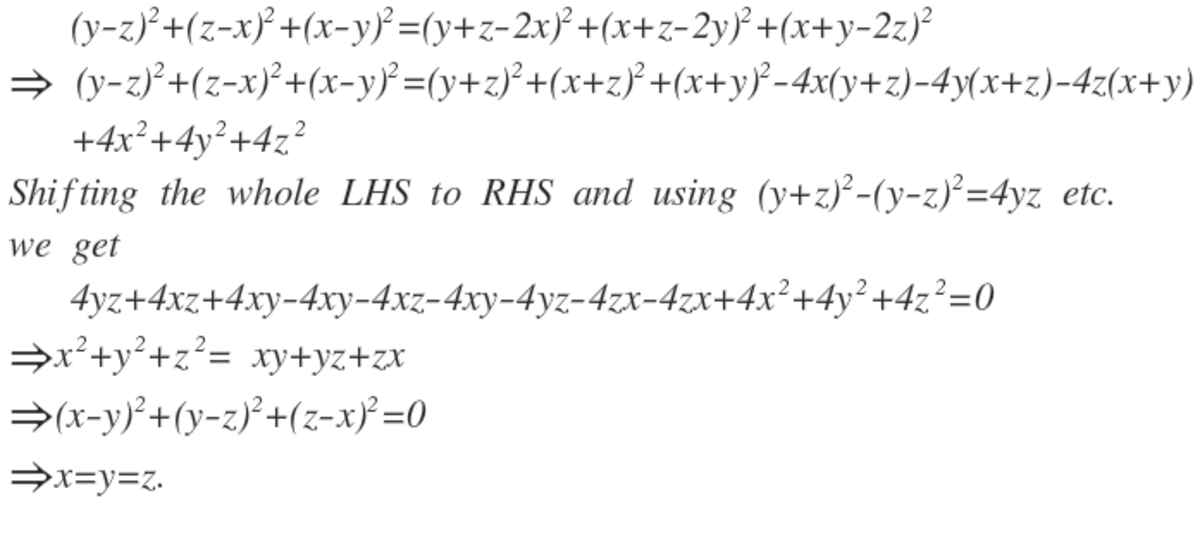JEE Novice - (2)
( y − z ) 2 + ( z − x ) 2 + ( x − y ) 2 = ( y + z − 2 x ) 2 + ( x + z − 2 y ) 2 + ( x + y − 2 z ) 2
If x , y and z are real numbers that satisfy the equation above, then which of the following must be true?
This question is a part of JEE Novices .
This section requires Javascript.
You are seeing this because something didn't load right. We suggest you, (a) try
refreshing the page, (b) enabling javascript if it is disabled on your browser and,
finally, (c)
loading the
non-javascript version of this page
. We're sorry about the hassle.
4 solutions
What is Muirhead's inequality?
Log in to reply
Log in to reply
thanks Prasun Biswas
The inequality x 2 + y 2 + z 2 ≥ x y + y z + z x ∀ x , y , z ∈ R with equality iff x = y = z can also be obtained by assuming (w.l.o.g) that x ≥ y ≥ z and using the Rearrangement Inequality.
Alternatively, you can do the following:
x 2 + y 2 + z 2 − x y − y z − z x = 2 1 [ ( x − y ) 2 + ( y − z ) 2 + ( z − x ) 2 ] ≥ 0
Rearranging it gives us that inequality and the equality case follows trivially.
This inequality can equivalently be obtained using either Lagrange's identity or Cauchy-Schwarz Inequality on the sets { x , y , z } and { 1 , 1 , 1 } .
2x^2 + 2y^2 + 2z^2 - 2xy - 2xz - 2yz = 6x^2 + 6y^2 + 6z^2 - 6xy - 6xz - 6yz
a^2 >= 0
=> if (y - z)^2 + (z - x)^2 + (x - y)^2 > 0
=> 1 = 3 which is false
=> (y - z)^2 + (z - x)^2 + (x - y)^2 = 0
=> y - z = z - x = x - y = 0
=> x = y = z
can we do it with symmetrical equations
Moderator note:
How did you reach the second line?
In such problems about algebraic manipulation, it is important to explain your steps clearly.

L H S = 2 ( x 2 + y 2 + z 2 ) − 2 ( x y + x z + y z ) R H S = 6 ( x 2 + y 2 + z 2 ) − 6 ( x y + x z + y z ) From this it can be seen that we require: x 2 + y 2 + z 2 = x y + x z + y z However, using Muirhead's inequality we can put the powers in bracket notation and show that: ( 2 , 0 , 0 ) ≥ ( 1 , 1 , 0 ) ⇒ x 2 + y 2 + z 2 ≥ x y + x z + y z With equality when x = y = z
Note: x 2 y 0 z 0 = ( 2 , 0 , 0 )